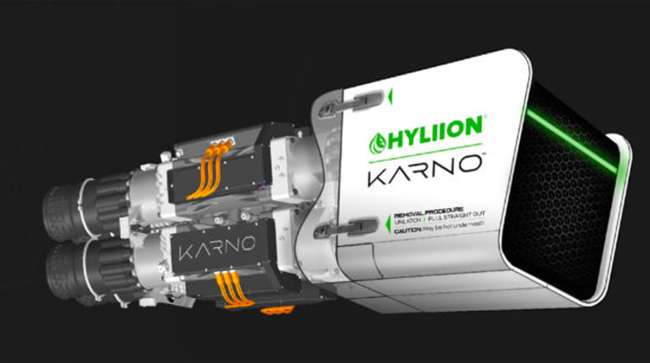Senior Reporter
Hyliion Acquires Generator Technology From GE Additive for $37 Million

[Stay on top of transportation news: Get TTNews in your inbox.]
Hyliion Holdings Corp., a provider of electrified powertrain solutions for Class 8 semi-trucks, has entered into a definitive agreement to acquire a new fuel-agnostic generator, the Karno, from GE Additive, a unit of GE.
The $37 million transaction is expected to close by the end of the third quarter. GE will receive $15 million in cash and about $22 million in Hyliion stock.
Hyliion will acquire the intellectual property portfolio for generator technology, the metal additive manufacturing equipment (3D printing) for prototyping, and integrate the Cincinnati-based engineering team that created the Karno system into Hyliion.
The technology is expected to achieve a 20% efficiency improvement over today’s conventional generators — by 3D printing of thermal components and innovative fuel-to-electricity conversion — and could prove more efficient than most available fuel cells, according to the Austin, Texas-based company.
The Karno power system will be capable of operating on more than 20 different fuels, including hydrogen, natural gas, propane, ammonia and conventional fuel.
Hyliion founder and CEO Thomas Healy told Transport Topics he considered Karno a disruptive technology. “Karno brings forward an unparalleled efficiency level and offers fuel flexibility. We believe this can be transformative for the industry while also achieving significant emissions improvements.”
ANNOUNCED TODAY: Hyliion acquires revolutionary hydrogen and fuel agnostic generator technology from GE
Read more here: https://t.co/2uIPQhAPrG pic.twitter.com/mJ9c9c7qdm — Hyliion (@hyliion) August 25, 2022
He said during a webinar, “We had already told the world we were going to have a fuel-agnostic generator. And that’s what led to the acquisition” after GE approached Hyliion.
The Karno generator emerged out of GE’s long-running R&D investments in metal additive manufacturing across multiple industries and in areas such as generator thermal and performance design.
Looking ahead, “the price that which we can produce electricity from this generator is staggering, significantly less than the cost of grid electricity,” Healy said — 7 cents per kilowatt hour compared with the average grid cost of 12 cents kWh.

Healy
“So the [modular] generator could be the supply of electricity for EV chargers,” Healy said. “That’s a smart move and something we have been working toward.”
The Karno’s basic principle is fuel is oxidized to produce heat.
“Then we use the heat to pressurize the linear motor to create electricity,” Hyliion Chief Strategy Officer Cheri Lantz said during a webinar.
The heat is produced by reacting fuels through flameless oxidation or by leveraging other heat sources including renewables, Hyliion noted.
Initial testing indicates the Karno generator is expected to comply with all current and foreseeable emission standards from the California Air Resources Board and the Environmental Protection Agency, even when utilizing conventional fuels, according to Hyliion.
Late next year, Hyliion plans to first release its Hypertruck ERX (extended range) Class 8 powertrain. On the Hypertruck ERX, a tank of renewable natural gas fuels a Cummins Inc. natural gas engine as a generator to charge the batteries that power an e-motor that drives the rear axles and provides regenerative braking. A range of 1,000 miles is expected, and there is the opportunity to run 75 miles on battery power alone.

Siamak Azmoudeh of SkyBitz discusses the rise of the smart trailer and why the industry standard is shifting toward more sensors, more data and more business intelligence. He joins host Seth Clevenger to explain the evolution of trailer telematics. Tune in above or by going to RoadSigns.ttnews.com.
In the years following, Hyliion plans to release the Hypertruck Karno, its fuel-agnostic variant, as phase two in the company’s journey to a hydrogen-based future.
Healy said Hyliion still is going through the commercialization process with the generator.
“We can say it’s a sealed system designed with [product] life in mind,” he said. “There is only one moving part per generator, which assists in reducing maintenance as well. Lastly, there is no oil or fluids that would need maintenance.”
Hyliion expects to have the Karno generator in a truck for initial testing within the next couple of quarters, Healy said.
“It is important that we get a production-level supply chain established,” Lantz said, “and make decisions between current prototype suppliers and at-scale production suppliers.
Want more news? Listen to today's daily briefing below or go here for more info:




